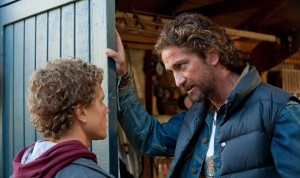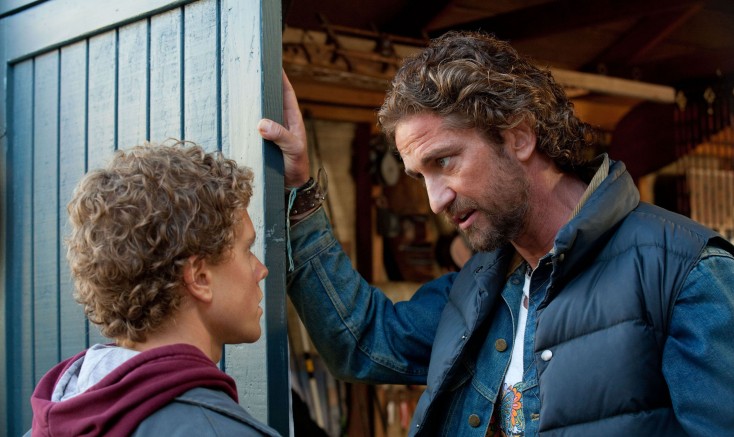
Frosty Hesson (Gerard Butler) offers some sage advice to Jay Moriarity (Jonny Weston) about surfing and life in Michael Apted’s “CHASING MAVERICKS.” ©20TH CENTURY FOX/WALDEN MEDIA. CR: john P. Johnson.
By ANGELA DAWSON
Front Row Features
HOLLYWOOD—You could call director Michael Apted a pinch hitter. When fellow filmmaker Curtis Hanson had to drop out of making the surf movie “Chasing Mavericks” just four weeks into filming, Apted, whose credits range for the James Bond actioner “The World is Not Enough” to “The Chronicles of Narnia: The Voyage of the Dawn Treader,” stepped in and took over.
At 71, Apted might seem like an unlikely choice to lens a big wave movie starring Gerard Butler (“300,” “Machine Gun Preacher”) and relative newcomer Jonny Weston, but the veteran filmmaker was curious about the subject matter and wanted to help out his friend.
Surfing is simply a backdrop for the story of a young California teenager named Jay Moriarity (Weston), who dreams of surfing the big waves of Mavericks, a coastal region near San Francisco. Butler plays Frosty, Jay’s surf instructor who becomes a father figure and mentor to the fearless boy. Based on a true story, the film combines the action of big wave surfing with a heartwarming tale about friendship, trust and the broad parameters of what constitutes a family.
Q: What was the attraction of this project for you? Are you a surfer?
Apted: (He chuckles.) The whole idea of surfing is inconceivable to me. I can’t actually stand up on that piece of wood and do it. I was attracted to direct it because I didn’t know that much about it. It seemed like a world that hadn’t been that well treated on film. There’s a great cult following for certain surfing films, but I thought it was a very interesting arena to have to deal with. I thought it was a good place to tell a fairly familiar story about father and sons—or surrogate fathers and sons—and who’s the son and who’s the father. I just liked the freshness of the setting for it. I thought it could be spectacular and I thought it could be really enjoyable for an audience to see. And I thought it would be a challenge for us all to try and do it right. It’s very complicated; any (film) work on water is complicated. To try and do this stuff and get it accurate was a big challenge.
Q: How did you and Curtis divvy up the responsibilities?
Apted: He set the film up and prepped the script (written by Kario Salem) and set the tone of it, and (directed) the first four weeks, but then he had to leave and I came in and finished it. But we were of a similar mind because he set the tone for the film, which was a documentary tone. That’s the way I would have wanted to do it, so we were on the same page.
Q: Did you shoot the surfing scenes as well?
Apted: No. That was Philip Boston and his crew of specialists. Phil was the second unit director. It was his responsibility to do all the big wave surfing (photography). Curtis and I would liaise with him and tell him what we wanted, and then he would go off and do it. Then he would deliver the materials to me, because I did all the post-production. Then we shaped it and put it into the movie. Neither Curtis nor I were ever out there on those big waves. We were out there but only on the edges (of the surf). Phil’s done a lot of surfing commercials and stuff like that.
Q: Did you know much about Mavericks or the story of Jay Moriarity?
Apted: I didn’t. I know San Francisco, but I didn’t know anything about that story. It was kind of a mystery. The more I asked, the more mysterious it became. Nobody knew about it until recently really. I’ve lived in California for 30-odd years and spent a lot of time in San Francisco, so it’s bizarre. (Mavericks) was kind of a secret for hundreds of years, and then it became known and only a few people surfed and gradually it opened up to the surfing community.
Q: Did you observe the chemistry between Gerard and Jonny on set?
Apted: It’s interesting, because you can’t always tell the difference between interactions in life and what goes on film. There was clearly a warmth between them but they didn’t hang out together. When they were doing their job and when they were on screen, (the chemistry) is there. Jonny was very respectful of Gerry, which I think is a very smart thing to be. He would listen to Gerry and pay attention to him and Gerry can be quite demanding. But Jonny kind of lived with that. He hadn’t done much (acting) before, so he was kind of vulnerable. While Gerry’s kind of a tough guy and can be aggressive, he’s also a sensitive man, so he knows how to handle people. So there was a chemistry and a respect there. They weren’t all over each other hanging out or partying together, but there was a mutual respect between the two of them, which I think translated to a strong relationship on film.
Q: Aside from the wave-riding, the characters take a lot of physical risks in this film, such as when Jay jumps off a roof into a pool, and another time when he holds on to the back of a bus on his skateboard. Did you think about the repercussions of young people seeing this and trying these dangerous stunts themselves?
Apted: I suppose I should have been more (concerned) about that than I was because I was just obsessed about the danger of the waves. To me that was life and death for people, which is why they had to be extraordinarily disciplined. We were mindful of how much we would let Jonny and Gerry do on the water. So riding behind the bus seemed such small potatoes to some of the stuff they were doing that I probably didn’t pay as much attention as I should.
Q: What precautions did you take so your actors didn’t get injured?
Apted: There was such a high degree of risk in some of the sequences—I was sort of obsessive about that—that we couldn’t take a chance. We had to be tough on Jonny even though he is a pretty good surfer. It’s such a specialized business being a big wave surfer. You have to say to him, “You’re not really equipped to do this. Your character has got to be as good as he can be and if you’re a little uncertain or if you don’t get the kind of balance that Jay’s character would have got, then you shouldn’t do it. You’re not doing your character or your performance any service.”
Q: This year marks the 50th anniversary of James Bond movies, and you, of course, directed 1999’s “The World is Not Enough.” Do you keep up with the Bond movies?
Apted: Yes. Out of interest and jealousy. (He chuckles.)
Q: What do you recall most about working on that film?
Apted: I loved it. Of course, I was scared to death while I was doing it. It was such a big film. I never thought I’d get through it. But once I got into the rhythm of it and once we started shooting it, what was so comforting about it was the people were very very nice—the (producers) Broccolis and Michael Wilson, (actor) Pierce (Brosnan), and the crew—it was like coming into a family. I was sort of dreading it; that I would be an outsider. But they embraced me so it really was one of the most fun jobs I’ve ever done.
Q: Your latest installment of the “Up” documentary series, “56 Up,” has been released in Britain. When is it going to be released in the U.S.?
Apted: It opens in New York on January 4 (2013) and in Los Angeles on January 18.
Q: After all these years following these people since they were kids and returning every seven years to film them, is it strange that this project is still a part of your life?
Apted: All my working life, yeah. I started (with “7 Up”) when I was 22 and now I’m very very old, so it has been a great gift. But it was all an accident. It was never meant to be what it became. And I think it’s the most original thing I’ve ever done or ever will do. I’m always grateful whenever someone brings it up. Whenever I’m on the road it, comes up, which I find enormously flattering and rewarding.





